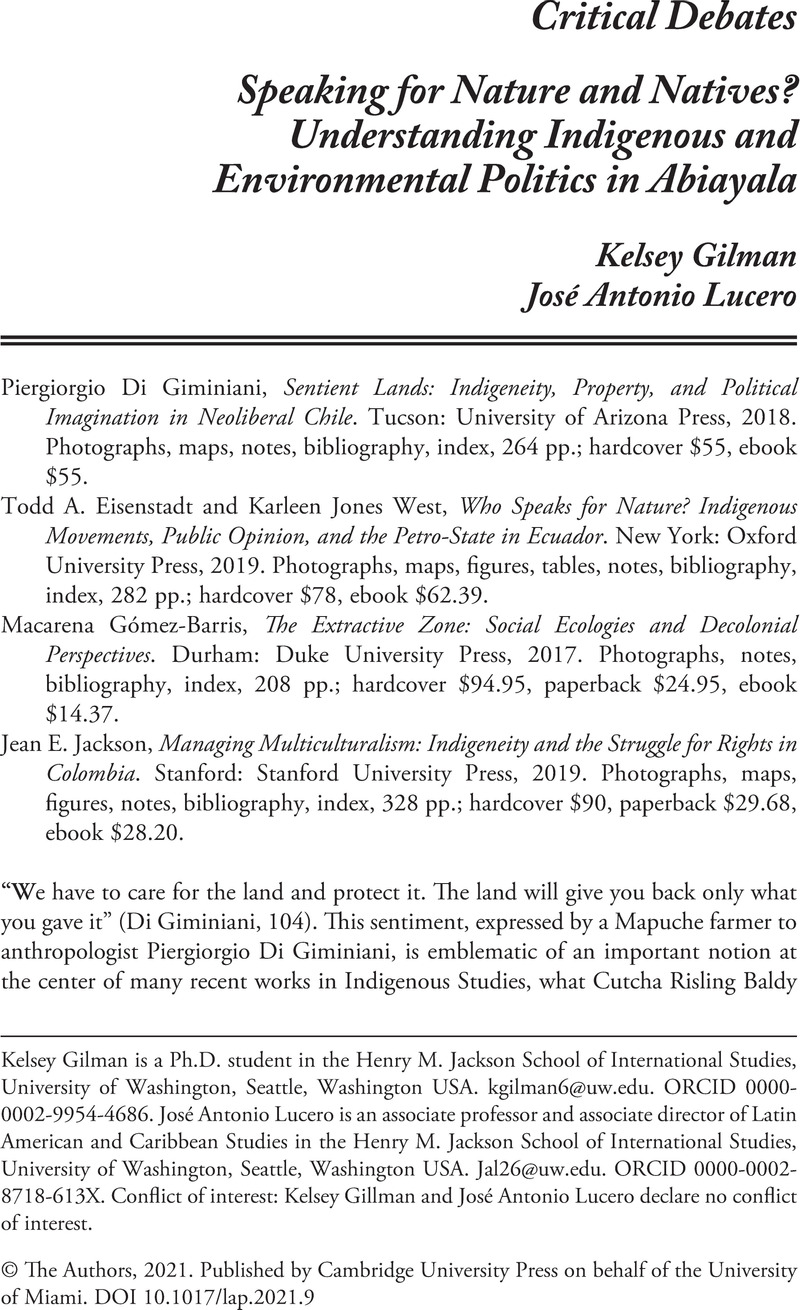No CrossRef data available.
Article contents
Speaking for Nature and Natives? Understanding Indigenous and Environmental Politics in Abiayala
Review products
Piergiorgio DiGiminiani, Sentient Lands: Indigeneity, Property, and Political Imagination in Neoliberal Chile. Tucson: University of Arizona Press, 2018. Photographs, maps, notes, bibliography, index, 264 pp.; hardcover $55, ebook $55.
Todd A.Eisenstadt and Karleen JonesWest, Who Speaks for Nature? Indigenous Movements, Public Opinion, and the Petro-State in Ecuador. New York: Oxford University Press, 2019. Photographs, maps, figures, tables, notes, bibliography, index, 282 pp.; hardcover $78, ebook $62.39.
MacarenaGómez-Barris, The Extractive Zone: Social Ecologies and Decolonial Perspectives.. Durham: Duke University Press, 2017. Photographs, notes, bibliography, index, 208 pp.; hardcover $94.95, paperback $24.95, ebook $14.37.
Published online by Cambridge University Press: 13 May 2021
Abstract
An abstract is not available for this content so a preview has been provided. Please use the Get access link above for information on how to access this content.

- Type
- Critical Debates
- Information
- Copyright
- © The Authors, 2021. Published by Cambridge University Press on behalf of the University of Miami
Footnotes
Conflict of interest: Kelsey Gillman and José Antonio Lucero declare no conflict of interest.
References
REFERENCES
Field, Les W. 1994. Who Are the Indians? Reconceptualizing Indigenous Identity, Resistance, and the Role of Social Science in Latin America. Latin American Research Review 29, 3: 237–48.Google Scholar
Keme, Emil. 2018. For Abiayala to Live, the Americas Must Die: Toward a Trans- hemispheric Indigeneity. Native American and Indigenous Studies, 5, 1: 42–68.CrossRefGoogle Scholar
Krech, Shepard III. 1999. The Ecological Indian: Myth and History. New York: W.W. Norton.Google Scholar
Sommer, Doris, ed. 2006. Cultural Agency in the Americas. Durham: Duke University Press.Google Scholar
Spivak, Gayatri. 1996. Subaltern Studies: Deconstructing Historiography? In The Spivak Reader, ed. Landry, Donna and MacLean, Gerald. London: Routledge 203–37.Google Scholar
Stern, Steve. 1992. Paradigms of Conquest: History, Historiography, and Politics. Journal of Latin American Studies 24, 5: 1–34.CrossRefGoogle Scholar
Vizenor, Gerald, ed. 2008. Survivance: Narratives of Native Presence. Lincoln: University of Nebraska Press.Google Scholar
Warrior, Robert. 1995. Tribal Secrets: Recovering American Indian Intellectual Traditions. Minneapolis: University of Minnesota Press.Google Scholar
Yazzie, Melanie K., and Baldy, Cutcha Risling. 2018. Introduction: Indigenous Peoples and the Politics of Water. Decolonization: Indigeneity, Education & Society 71: 1–8.Google Scholar


